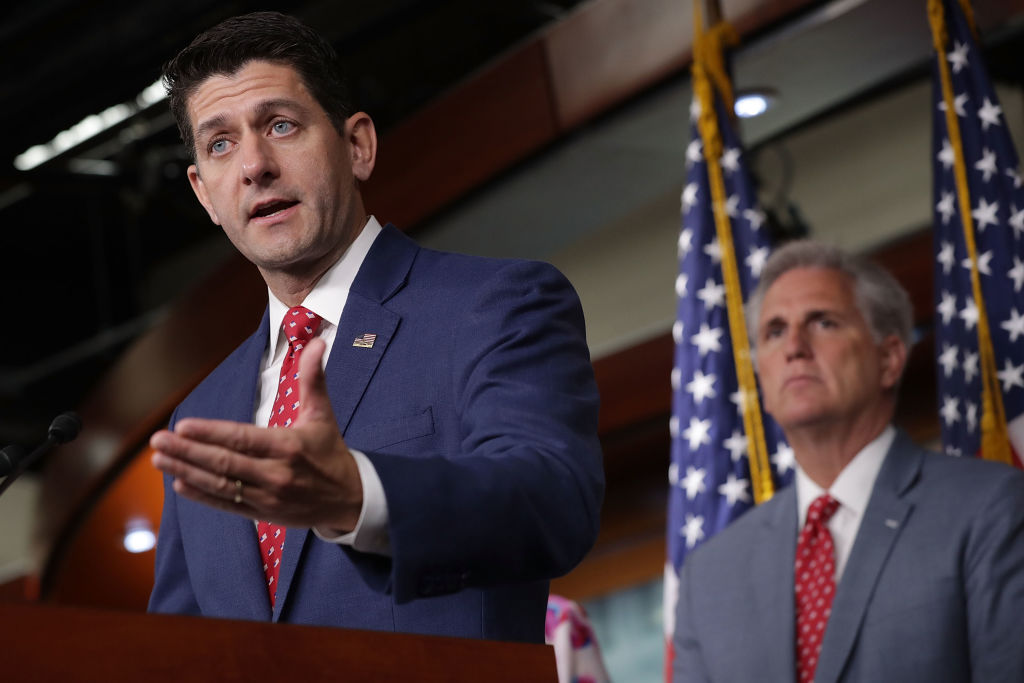The Midwest, independents, suburbanites, and small towns are souring on the GOP, new polls indicate


A free daily email with the biggest news stories of the day – and the best features from TheWeek.com
You are now subscribed
Your newsletter sign-up was successful
Voters are shifting toward Democrats two months before pivotal midterm elections, according to polls Wednesday morning from Quinnipiac University and NPR/Marist. In the Quinnipiac poll, Democrats have opened up a 14-point lead on which party voters plan to pick for Congress, 52 percent to 38 percent; notably, independent voters say they'll vote for the Democrat 50 percent to 35 percent. The NPR/Marist poll found a 12-point gap on the generic congressional ballot, with 50 percent of voters picking the Democrat and 38 percent the Republican candidate. In the same poll in July, Democrats had a 7-point lead.
Republicans lost ground across the board in the NPR/Marist poll, but the Midwest appears to have especially swung toward the Democrats, shifting 13 points since July. "Every way we are looking at the data, the same general pattern is emerging," said Marist's Lee Miringoff. "The Midwest is an area that is getting restless about what they hoped was going to occur and what they feel is not occurring." Small towns have also swung toward Democrats by 11 points and Republicans had a 6-point drop in support in rural areas. In the suburbs, Democrats have a 56 percent-to-34 percent advantage over Republicans.
"Could the 'blue wave' become a tsunami?" asked Quinnipiac's Tim Malloy. "There are a lot of factors, and eight weeks of campaigning, that make up the answer to that question." One big factor is President Trump, whose approval rating in the NPR/Marist poll is 39 percent — making it the third poll this week to put his approval number below 40 percent. Miringoff suggests Trump's disruptive trade war is eroding his support among Midwestern farmers and factory workers. Trump's low approval rating is clearly "casting a cloud over the GOP Congress," Miringoff said. The Late Show had some fun imagining the White House's pushback.
The Week
Escape your echo chamber. Get the facts behind the news, plus analysis from multiple perspectives.

Sign up for The Week's Free Newsletters
From our morning news briefing to a weekly Good News Newsletter, get the best of The Week delivered directly to your inbox.
From our morning news briefing to a weekly Good News Newsletter, get the best of The Week delivered directly to your inbox.
Quinnipiac surveyed 1,038 voters by phone Sept. 6-9, and its poll has a ±3.7-point margin of error. Marist surveyed 777 voters Sept. 5-9, and its poll's margin of error is ±4 points.
A free daily email with the biggest news stories of the day – and the best features from TheWeek.com
Peter has worked as a news and culture writer and editor at The Week since the site's launch in 2008. He covers politics, world affairs, religion and cultural currents. His journalism career began as a copy editor at a financial newswire and has included editorial positions at The New York Times Magazine, Facts on File, and Oregon State University.
-
 Currencies: Why Trump wants a weak dollar
Currencies: Why Trump wants a weak dollarFeature The dollar has fallen 12% since Trump took office
-
 Book reviews: ‘Hated by All the Right People: Tucker Carlson and the Unraveling of the Conservative Mind’ and ‘Football’
Book reviews: ‘Hated by All the Right People: Tucker Carlson and the Unraveling of the Conservative Mind’ and ‘Football’Feature A right-wing pundit’s transformations and a closer look at one of America’s favorite sports
-
 Judge blocks Trump suit for Michigan voter rolls
Judge blocks Trump suit for Michigan voter rollsSpeed Read A Trump-appointed federal judge rejected the administration’s demand for voters’ personal data
-
 Judge blocks Trump suit for Michigan voter rolls
Judge blocks Trump suit for Michigan voter rollsSpeed Read A Trump-appointed federal judge rejected the administration’s demand for voters’ personal data
-
 US to send 200 troops to Nigeria to train army
US to send 200 troops to Nigeria to train armySpeed Read Trump has accused the West African government of failing to protect Christians from terrorist attacks
-
 Grand jury rejects charging 6 Democrats for ‘orders’ video
Grand jury rejects charging 6 Democrats for ‘orders’ videoSpeed Read The jury refused to indict Democratic lawmakers for a video in which they urged military members to resist illegal orders
-
 Judge rejects California’s ICE mask ban, OKs ID law
Judge rejects California’s ICE mask ban, OKs ID lawSpeed Read Federal law enforcement agents can wear masks but must display clear identification
-
 Lawmakers say Epstein files implicate 6 more men
Lawmakers say Epstein files implicate 6 more menSpeed Read The Trump department apparently blacked out the names of several people who should have been identified
-
 Japan’s Takaichi cements power with snap election win
Japan’s Takaichi cements power with snap election winSpeed Read President Donald Trump congratulated the conservative prime minister
-
 Trump sues IRS for $10B over tax record leaks
Trump sues IRS for $10B over tax record leaksSpeed Read The president is claiming ‘reputational and financial harm’ from leaks of his tax information between 2018 and 2020
-
 Trump, Senate Democrats reach DHS funding deal
Trump, Senate Democrats reach DHS funding dealSpeed Read The deal will fund most of the government through September and the Department of Homeland Security for two weeks
